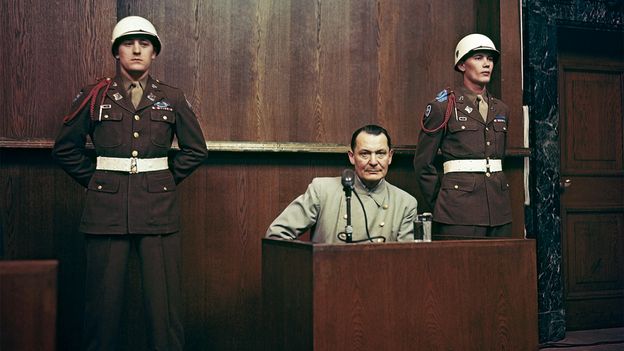The Nuremberg trials, held in 1945, stand as a pivotal moment in history, marking an unprecedented attempt to hold individuals accountable for war crimes. Eighty years later, the new film ‘Nuremberg’, starring Russell Crowe, revisits this critical chapter, prompting us to reflect on the wellspring of fascism and the true nature of evil. This article delves into the historical context of the trials, the key figures involved, and the enduring questions that continue to resonate today.
Drawing on insights from Jack El-Hai’s ‘The Nazi and the Psychiatrist’, the film explores the complex relationship between Hermann Göring and the young army psychiatrist tasked with assessing his mental competence. Through this lens, ‘Nuremberg’ examines not only the individual culpability of Nazi leaders but also the broader societal factors that allowed such atrocities to occur. Join us as we unpack the real story behind the Nuremberg trials and its lasting impact on our understanding of justice and human nature.
The Unprecedented Attempt to Hold Individuals Accountable
In the aftermath of World War II, the decision to prosecute the Nazi high command at Nuremberg was groundbreaking. Instead of resorting to summary executions, the Allied forces – the US, the UK, France, and the Soviet Union – opted for a trial, a move that underscored the principles of justice and accountability. However, this decision was not without its challenges. Many Germans viewed the trials as ‘victor’s justice,’ placing immense pressure on the prosecutors and judges to act impartially.
The Nuremberg trials have inspired filmmakers before, notably Stanley Kramer with his 1961 Oscar-winning classic, ‘Judgment at Nuremberg.’ James Vanderbilt, known for scripting ‘Zodiac’ and ‘The Amazing Spider-Man,’ revisits this history in his new film, emphasizing the importance of remembering these events. ‘This history mustn’t be forgotten,’ Vanderbilt stated, highlighting the growing distance between contemporary audiences and the realities of Nazi crimes.
The Complex Dynamic Between Göring and Dr. Kelley
James Vanderbilt’s ‘Nuremberg’ finds its unique angle in the relationship between Hermann Göring, Hitler’s second-in-command, and Douglas M Kelley, the US Army psychiatrist assigned to evaluate the Nazi leaders’ mental states. This dynamic, explored in Jack El-Hai’s book, ‘The Nazi and the Psychiatrist,’ forms the emotional core of the film. Göring, portrayed as flamboyant and manipulative, was captured near Salzburg, Austria, in May 1945. His initial interactions with his captors revealed a man who fascinated and captivated those around him.
At Bad Mondorf, Luxembourg, Kelley began his interviews with Göring, uncovering the former Reichsmarschall’s addiction to paracodeine. As Kelley helped Göring overcome his addiction and lose weight, a complex connection formed between the two men. El-Hai notes that Kelley recognized shared personality traits, including charm, intelligence, drive, defiance, ego, and loyalty.
Searching for the Roots of Evil
Dr. Kelley’s primary ambition was to identify a shared psychosis or derangement among the Nazi leaders, believing that only a profound mental disturbance could explain their monstrous actions. However, after extensive study, Kelley concluded that these men were, above all, opportunists who seized the chance to wield power and exploit others. ‘And he concluded there have always been people like this, although the atrocities they commit are much smaller,’ El-Hai explains.
In the film, Rami Malek as Kelley and Russell Crowe as Göring showcase compelling onscreen chemistry, depicting the evolving trust and interactions between the two men. Göring even asks Kelley to adopt his daughter, Edda, revealing a sign of respect that deeply moved the psychiatrist. This request, though not depicted in the film, underscores the complex and often unsettling connections formed during the trials.
Confronting the Atrocities in Court
The second half of ‘Nuremberg’ shifts to the courtroom, where Göring mounts a vigorous defense. Crowe’s portrayal captures Göring’s self-effacing repartee, which initially wrong-foots the US chief prosecutor, Robert H Jackson (played by Michael Shannon). However, the British lawyer Sir David Maxwell-Fyfe (Richard E Grant) successfully uses incriminating documents to demonstrate Göring’s direct responsibility for the persecution of Jews.
A turning point in the trial occurs with the screening of graphic film footage from the liberated concentration camps. These images brought the full horror of the Holocaust into the courtroom, conveying the true scale of the Nazis’ crimes. Dr. Thomas Schwartz notes that Eisenhower insisted on filming the camps, recognizing the power of visual evidence in conveying the atrocities.
Suicide, Reflection, and Enduring Questions
Göring was sentenced to death by hanging but took his own life with cyanide the night before his execution. The film leaves the method of obtaining the cyanide unexplained, though a 2005 confession from a US prison guard offers a plausible account. In the film, a young sergeant, Howard Triest (played by Leo Woodall), delivers a powerful message about collective responsibility: ‘Do you know why it happened here? Because people let it happen.’
Douglas M Kelley’s post-war life was marked by reflection on the question of collective national guilt and a concern about the rise of fascism. He wrote ’22 Cells in Nuremberg’ and lectured widely but struggled to achieve professional success. Tragically, Kelley took his own life in 1958, mirroring Göring’s suicide. His death serves as a poignant reminder of the profound impact of the Nuremberg trials on those who participated in them.
The Enduring Relevance of Nuremberg
The Nuremberg trials remain a crucial historical event, reminding us of the importance of accountability and the dangers of unchecked power. James Vanderbilt’s ‘Nuremberg’ sheds light on the complexities of this period, exploring the relationships and questions that continue to resonate today. By focusing on the human dynamics and moral dilemmas, the film ensures that this history is not forgotten.
As we reflect on the events of Nuremberg, it is essential to remember the lessons learned and remain vigilant against the forces that can lead to such atrocities. The film ‘Nuremberg’ serves as a powerful reminder of the past and a call to action for the present, urging us to confront the true nature of evil and uphold the principles of justice and human dignity.

Leave a Reply